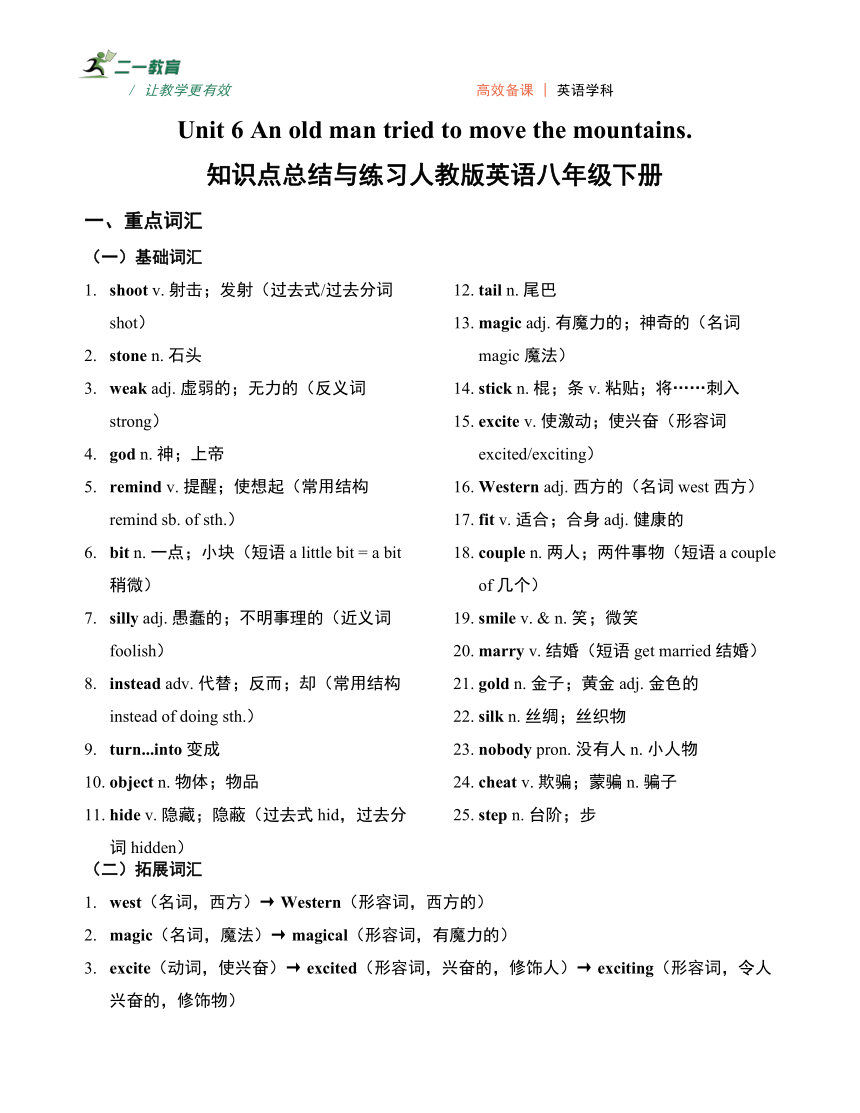
Unit 6 An old man tried to move the mountains. 知识点总结与练习人教版英语八年级下册 一、重点词汇 (一)基础词汇 / 让教学更有效 高效备课 | 英语学科 shoot v. 射击;发射(过去式/过去分词 shot) stone n. 石头 weak adj. 虚弱的;无力的(反义词 strong) god n. 神;上帝 remind v. 提醒;使想起(常用结构 remind sb. of sth.) bit n. 一点;小块(短语 a little bit = a bit 稍微) silly adj. 愚蠢的;不明事理的(近义词 foolish) instead adv. 代替;反而;却(常用结构 instead of doing sth.) turn...into 变成 object n. 物体;物品 hide v. 隐藏;隐蔽(过去式 hid,过去分词 hidden) tail n. 尾巴 magic adj. 有魔力的;神奇的(名词 magic 魔法) stick n. 棍;条 v. 粘贴;将……刺入 excite v. 使激动;使兴奋(形容词 excited/exciting) Western adj. 西方的(名词 west 西方) fit v. 适合;合身 adj. 健康的 couple n. 两人;两件事物(短语 a couple of 几个) smile v. & n. 笑;微笑 marry v. 结婚(短语 get married 结婚) gold n. 金子;黄金 adj. 金色的 silk n. 丝绸;丝织物 nobody pron. 没有人 n. 小人物 cheat v. 欺骗;蒙骗 n. 骗子 step n. 台阶;步 (二)拓展词汇 west(名词,西方)→ Western(形容词,西方的) magic(名词,魔法)→ magical(形容词,有魔力的) excite(动词,使兴奋)→ excited(形容词,兴奋的,修饰人)→ exciting(形容词,令人兴奋的,修饰物) marry(动词,结婚)→ marriage(名词,婚姻) hide(动词,隐藏)→ hidden(过去分词/形容词,隐藏的) 二、短语归纳 work on sth. 从事于某事;努力改善或完成某事 as soon as 一……就……(引导时间状语从句) once upon a time 从前(常用于故事开头) instead of (doing) sth. 代替(做)某事 turn...into... 把……变成…… get married (to sb.) (与某人)结婚 fall in love (with sb.) 爱上(某人) all over the world 全世界 in the moonlight 在月光下 lead sb. to sp. 带领某人到某地 make a plan 制定计划 a little bit 有点儿(修饰形容词或副词) give up (doing sth.) 放弃(做某事) solve a problem 解决问题 different opinions 不同的观点 三、词义辨析 (一)such as vs. for example 区别 such as for example 用法 列举同类事物中的多个例子,直接跟例子,无逗号 列举一个例子,用逗号隔开,可位于句首、句中或句尾 例句 He likes fruits such as apples and bananas. (他喜欢苹果、香蕉等水果。) For example, he likes apples. (例如,他喜欢苹果。) (二)unless vs. if not unless(连词):除非;如果不,引导条件状语从句(= if...not),从句用一般现在时表将来。 例:Unless you study hard, you won’t pass the exam. = If you don’t study hard, you won’t pass the exam. (除非你努力学习,否则你不会通过考试。) if not:如果不,更口语化,可单独使用。 例:Hurry up, if not, you’ll be late.(快点,否则你会迟到。) (三)alone vs. lonely alone(adj./adv.):独自的(地),强调客观状态,无感彩。 例:She lives alone, but she doesn’t feel lonely.(她独自生活,但不感到孤独。) lonely(adj.):孤独的,强调主观感受,可修饰人或地方(“荒凉的”)。 例:The old man feels lonely because his children are far away.(老人因孩子远在他乡而感到孤独。) 四、重点句型 Once upon a time, there was a very old man. 从前,有一位非常年迈的老人。 As soon as the man finished talking, Yu Gong said that his family could con ... ...
~~ 您好,已阅读到文档的结尾了 ~~